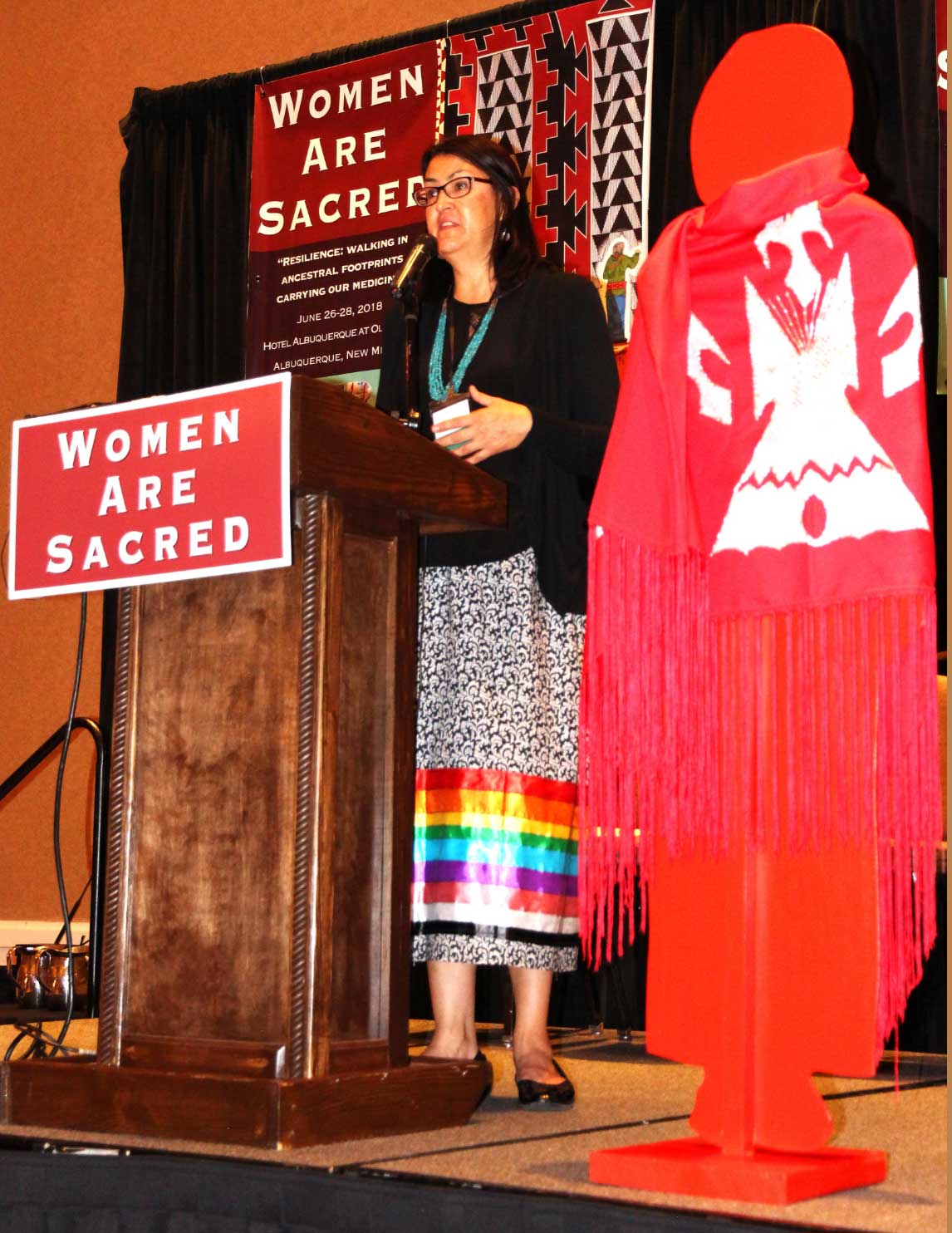Hundreds of Advocates Gather for 13th Women Are Sacred Conference to Further Safety for Native Women and Children

Lucy Simpson, NIWRC Executive Director, gives introductions and welcomes attendees to the 2018 Women Are Sacred Conference in Albuquerque, NM on June 26th.
For Immediate Release:
ALBUQUERQUE, New Mexico – More than 500 attendees are expected at the 13th annual Women Are Sacred Conference (WAS), one of the oldest and largest gatherings of advocates dedicated to ending violence against American Indian and Alaska Native women and children, held this week at the Hotel Albuquerque at Old Town. The conference, presented by the National Indigenous Women’s Resource Center (NIWRC), will feature voices from across the country, including advocates, survivors of violence, law enforcement and court personnel, tribal leaders, as well as tribal youth.
This year’s WAS conference theme is: “Resilience: Walking in Ancestral Footprints, Carrying our Medicine.” This theme speaks to who we are as Indigenous peoples and our journey towards rebuilding our communities in a way that honors our ancestors’ sacrifices, hope and love for our traditions and people. It speaks to the many different traditions and nations we come from, what was taken from us, and how we can rebuild the fire from the embers that are still glowing. We have survived through our cultural strength, resilience and the Indigenous knowledge that we carry with us into the future - our ancestor’s medicine. As Indigenous people, we come from deep roots, and we need to nurture those roots in our movement to create social change and end violence across all our relations. With deep roots we cannot be washed away.
WAS is one of the oldest and largest gatherings of advocates, survivors, tribal domestic and sexual violence programs, community members, tribal leadership, law enforcement and tribal court personnel dedicated to ensuring the safety and protection of Native women and children. Presenters include emerging Indigenous leaders and experts in the movement to ending violence in recognizing that Native people are best able to address violence in our communities–“Carry Our Own Medicine.” Sessions offer training opportunities to help increase the capacity of tribal nations and tribal domestic violence and community-based programs to address violence in their communities, as well as address safety issues and provide resources for victims and survivors of domestic violence, sexual assault, sex trafficking, and missing and murdered Indigenous women.
Updates on national policies and national issues will also be given and include – the Violence Against Women Act, Victims of Crime Act, Tribal Law and Order Act, Savannah’s Act, and more. Safety for Native women is vital in the national conversation due to the disproportionate rates of domestic violence, sexual assault and other forms of gender-based violence that occur at alarmingly high rates. According to the National Institute of Justice reported more than 4 in 5 American Indian and Alaska Native women (84.3%) have experienced violence in their lifetime, including:
- 56.1% who have experienced sexual violence.
- 55.5% who have experienced physical violence by an intimate partner.
- 48.4% who have experienced stalking.
- 66.4% who have experienced psychological aggression by an intimate partner.
Five years ago, Congress reauthorized VAWA, which is now set to expire in 2018. Speakers will offer updates on the upcoming VAWA Reauthorization and implementation of VAWA Title IX Sec. 901. Findings...”(6) the unique legal relationship of the United States to Indian tribes creates a Federal trust responsibility to assist tribal governments in safeguarding the lives of Indian women.”
Conference co-sponsors include the StrongHearts Native Helpline, Coalition to Stop Violence Against Native Women, Mending the Sacred Hoop, National Congress of American Indians, National Center of Juvenile and Family Court Judges, Indian Law Resource Center, Alaska Native Women’s Resource Center, Bureau of Indian Affairs Victim Assistance Program, Minnesota Indian Women’s Sexual Assault Coalition, Tewa Women United, Americans for Indian Opportunity, Tribal Law & Policy Institute, American Indian Development Association, Pouhana ‘O Na Wahine and the Hispano Chamber of Commerce.
Conference Highlights, by day:
Tuesday, June 26th: Conference attendees are encouraged to wear their traditional clothing to celebrate Indigenous roots and culture. Keynote speaker Taylor Sheridan, Writer and Director of the feature film Wind River, will speak during the opening session. Sheridan is an Academy Award-nominated screenwriter, Taylor Sheridan is currently writing, directing, and executive producing the upcoming series “Yellowstone” for the newly launched Paramount Network. A frontier family drama set on the largest contiguous ranch in the U.S., the project stars Kevin Costner, Josh Lucas, Luke Grimes, Gil Birmingham, and Kelly Reilly and will premiere on June 20, 2018. The Acoma Pueblo Traditional Dance is featured in the evening.
Wednesday, June 27th: Conference attendees are encouraged to wear red in remembrance and to promote awareness of missing and murdered Indigenous women and girls across the United States. The NIWRC policy team has been working to ensure permanent designation of May 5th as a National Day of Awareness for Missing and Murdered Indigenous Women and Girls (MMIW). To help shed light on MMIWG, a local Albuquerque organizing collective of Indigenous Women is creating an exhibit called “Missing & Murdered Indigenous Women Earring Project.” All Things Feminine Powwow will take place in the evening starting at 7:00 – 10:00pm. It is free & open to the public.
Thursday, June 28th: Conference attendees are encouraged to wear purple to support and raise awareness of domestic violence in tribal communities. Often victims don’t report the abuse because often there are no resources or access to services and speaking up can mean getting a loved one in trouble, challenging a powerful family, or having to endure victim blaming and shaming, and not being believed. We must work collectively to stop domestic violence – all forms of violence – in our communities.





